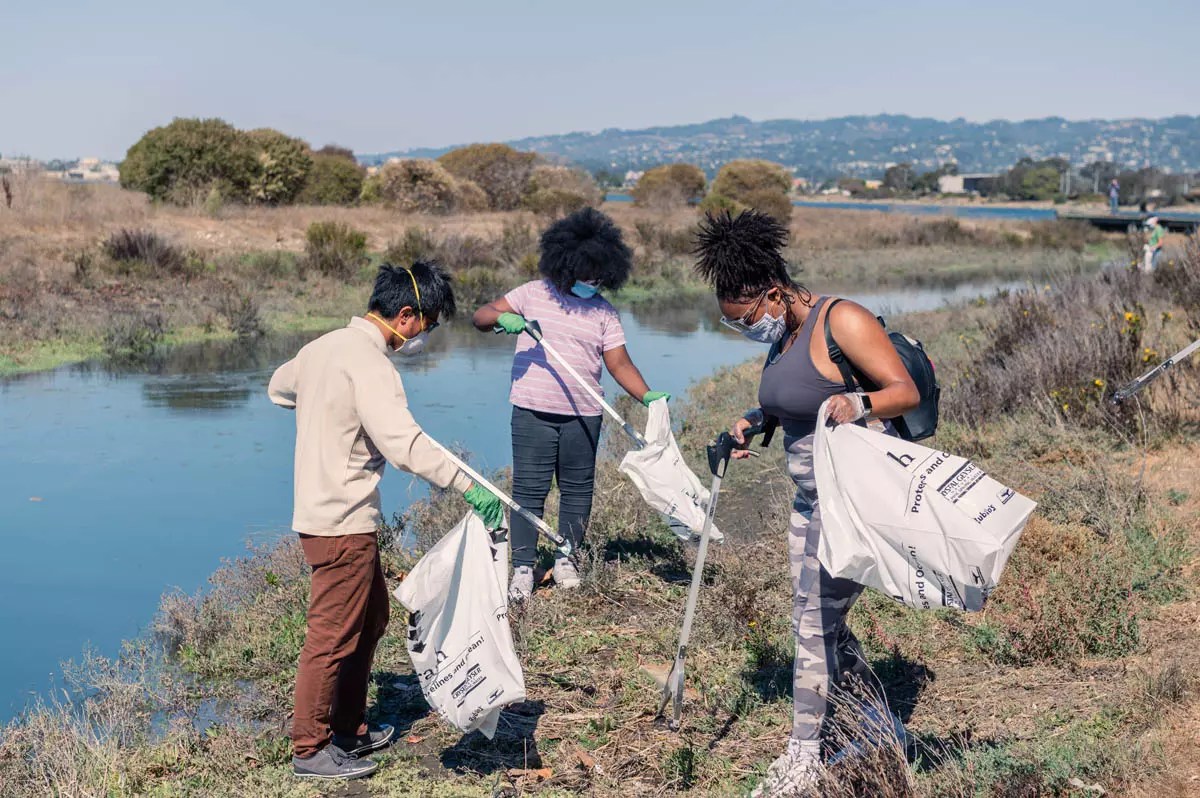Clean Ride by Power the People to Oakland Shore
Keta Price, an East Oakland activist and local planner, finds it difficult to get to the nearest shoreline for a little fresh air and time out on the waterfront. Oakland’s bayshore open spaces lie hidden in corners of the giant shipping and trucking landscape of the port, or between airport runways, military bases, industrial zones and bridge on-ramps. If you don’t have a car to wend your way around the concrete superstructures of eight-lane freeways, rail and BART lines, or other obstacles between the city and the Bay, shoreline parks and public open spaces can seem pretty inaccessible.
“We want to stitch East Oakland neighborhoods to the shore and increase public transit access,” says Price, who just launched a project to do just that called Power the People: Martin Luther King Jr. Shoreline Access Study.
Living and working on resilience projects around the Oakland Coliseum area for years, Price has an intimate knowledge of the landscape and people who live there. Before COVID restrictions suspended service, Price had been impressed with the free Broadway B shuttle, which made a clean, quiet loop with zero emissions to key destinations along Oakland’s main street.
“We want to do the same thing, connect a transit center deep in the neighborhood to parks like Martin Luther King Shoreline with a fare-free clean air bus,” she says. The East Oakland Collective’s Power the People is engaging Black and POC residents in activities aimed at identifying which clean mobility options would best support them in accessing the shoreline, she says.
On Clean Air Day on October 9, for example, a group of people from the community rode bikes from East Oakland to the shoreline; helped pick up trash from the marsh, creek banks and bayshore; and celebrated with food, music, art and other activities (see slideshow below).
One focal point of Power the People is to explore the feasibility of creating a new fare-free zero emissions bus route along 73rd Ave. The study will also explore other clean mobility options such as biking, walking and skating to bring East Oakland residents from 94603, 94605 and 94621 zip codes to the Martin Luther King Jr. Shoreline park. Support for the community-led access study is coming from cap-and-trade funding and the Oakland Department of Transportation.
Price begins to talk fast when she gets going on all her ideas for helping Black and POC residents reclaim and restore shoreline spaces, and “explore culturally relevant recreation on the shore.” She mentions the Bay Trail, Doolittle Drive, resilience and equity hubs, transportation corridors and greenways. “Our neighborhoods need secure access to and from the shoreline in the face of sea level rise, that’s how the transportation infrastructure is tied to climate adaptation,” she says.
Price also points to increased visits to local urban parks and open space during the pandemic. “East Bay Parks recognizes this need, and we have their ear,” says Price, talking about her other endeavors through the East Oakland collective to promote events on the shore that highlight Black culture and educate the community about ecology. “We need to decriminalize Black folks enjoying and holding activities in green spaces,” she says.
Clean Air Day Bike to the Shore Slide Show ~ Photos Lonny Meyer
Other Recent Posts
Rising Waters Bring New Toxics Threat to Hunters Point
S.F.’s Hunters Point is already toxic for residents and the Bay. Sea level and groundwater rise, along with bigger storms, threaten to make the problem worse.
Harmful Blooms Spur More Wastewater Upgrades
To reduce nitrogen loads, the Bay Area is facing an overhaul of wastewater plants to the tune of $16B. Sea level rise calls for other retrofits. The two could require the heftiest investment in clean water infrastructure in decades.
Cultivate Climate Champions with Nature-Based Education
Everyday Climate Champions Podcast
Growing Resilience with Seed Libraries
Sierra Garcia, San Francisco
Fifth Graders Model Climate Resilience
Laurel Dell Elementary, San Rafael
Resilience is like? Caption Contest
Cartoons can tell so many stories about being kneedeep in climate resilience work. What’s your idea for a cartoon?
Teaming Up to Tackle East Bay Wet Spots
Partners push for three projects and a big grant to protect a critical swath of the East Bay shoreline from sea-level and groundwater rise.
The Itchy Cost of Hotter Summers
Mosquito-borne disease is on the rise thanks to climate change. Will the Bay Area get new mosquito species? Climate change might push them to cooler climates.
Rail Line Reinvents Itself After Pandemic Slump
This North Bay rail system is winning back ridership against the odds, catering to bikers, hikers, shoppers and commuters.
Hard Park Going Soft in Alameda
The City of Alameda is planning to de-pave an area of the former Alameda Naval Air station the size of nine football fields and transform it into an ecological nature park.




















































